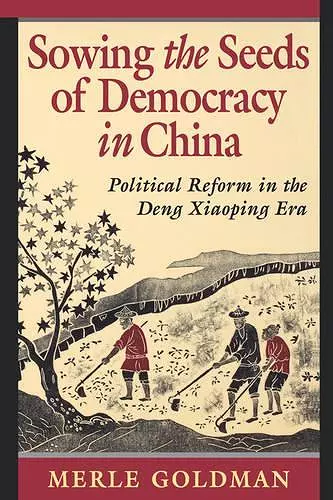Sowing the Seeds of Democracy in China
Political Reform in the Deng Xiaoping Era
Format:Paperback
Publisher:Harvard University Press
Published:18th Apr '95
Currently unavailable, and unfortunately no date known when it will be back

The West’s leading authority on the role of intellectuals in contemporary China presents a percipient account of the efforts at political reform in the Deng Xiaoping era. Merle Goldman describes a group of highly placed intellectuals who, with the patronage of Deng Xiaoping’s designated successors Hu Yaobang and then Zhao Ziyang, attempted to reshape both China’s Marxist–Leninist ideology and its political system.
[A] definitive study of China’s dissidents… [Goldman] is the foremost Western expert on China’s intellectual dissidents—especially writers—since the founding of the People’s Republic in 1949… Whenever one seeks an explanation, Goldman furnishes it. -- Jonathan Mirsky * New York Times Book Review *
Goldman selects about three dozen figures for careful study… Some of the subjects…appear in one of [her] two earlier books (Literary Dissent in Communist China and China’s Intellectuals). The three books are similar in style, chronologically consecutive, and together make a comprehensive and shrewdly analytical history of the battles that have taken place over dissident thought in Communist China. -- Perry Link * New York Review of Books *
Until now, no work has adequately probed the intellectual climate of China’s decade of reform ending in the Tiananmen drama of May–June 1989. With sensitivity to both the Confucian and Maoist past, Goldman, in a gripping narrative, reviews the lives and activities of a host of intellectual gadflies. * Virginia Quarterly Review *
The title of Goldman’s new volume is misleading: the book is not simply a recounting of political reform (or its lack) in post-Mao China, but a fascinating account of how China’s intellectuals sought to produce such reform in a sometimes favorable, but often hostile, environment. We learn an enormous amount from this book about who the important intellectual actors are in post-Mao China as well as about their views, activities, and relationship to elites and how each of these changed during the course of the era. Goldman’s interesting conclusion is that China’s intellectuals largely failed in their efforts to bring about political reform through the traditional means of appealing to elite sponsors and acting as the voice of the masses. * Journal of Interdisciplinary History *
Goldman’s book is a valuable addition to a growing literature which seeks to understand the changing nature of Chinese politics in the wake of the economic reform. -- Zhimin Lin * Review of Politics *
This exciting volume by a senior scholar full of profound insights will be welcomed by all students of contemporary China as well as by all interested in struggles for democratization. Rich and detailed, the book is full of new and important data. The writing is strong and dynamic. This is a wonderful book! -- Edward Friedman, University of Wisconsin
An outstanding Sinological study which brings up to date the complex relationships between the Chinese intellectuals and their government… Goldman has seemingly perfected the art of meticulous textual analysis of the writings of Chinese thinkers. -- Lucian W. Pye, Massachusetts Institute of Technology
ISBN: 9780674830080
Dimensions: 235mm x 156mm x 32mm
Weight: 562g
444 pages